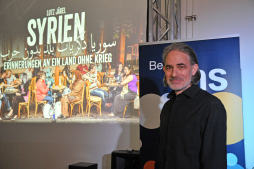"All people smile in the same language".
Full house at the Syria lecture with Lutz Jäkel
"Syria - memories of a country without war" is the title of the multimedia live report that almost 100 guests listened to on Thursday evening in the former Futura in the Media Centre.
Muaiad Abd Alrahman, member of the Integration Council and himself a Syrian refugee, welcomed the guests on behalf of the Adult Education Centre Bocholt-Rhede-Isselburg and the Integration Office and Integration Council of the City of Bocholt, which had jointly organised this lecture.
"I have been in Germany since 2016 and I am pleased that the VHS and the Integration Office were able to win Lutz Jäkel for the lecture today."
Jäkel, photojournalist, author and lecture speaker, reported that nowadays many people - also in Bocholt - now have Syrian neighbours, work colleagues and yes - even Syrian friends already. "Many certainly also have contact through their voluntary work, and today I would like to show you what Syria looked like before the war," said Jäkel.
Massa Al-Kher and Massa An-Nour
It didn't take Jäkel long to warm up to the guests. There was a bit of Arabic right at the beginning, when he greeted the guests with "Massa Al-Kher", which means "Good evening". "And what do you answer me then? Massa An-Nour, which means "I wish you a night full of light". At the second attempt, it worked out well.
The graduate in Islamic Studies visited Syria for the first time in 1993 as part of his studies and was immediately enthusiastic. "No country of my many travels has influenced and impressed me as much as Syria," Jäkel emphasised. He started with photographs by war photographer Christian Werner, which showed the extent of destruction from now more than 12 years of war. "This is the first thing we have in mind when we think of Syria today: war, destruction and suffering," Jäkel said. He wanted to contrast his very personal memories and photos from twenty years of travelling through Syria with the images of war.
This is Syria
The first stop on Jäkel's journey was Damascus, the capital and oldest city in the world, where people have lived for over 6,000 years. According to legend, Cain slew his brother Abel here, it is the birthplace of Abraham, and the tomb of John the Baptist is also said to be located there. When he arrived at the airport in Damascus, the first place he always went was "Bagdash", the oldest ice cream parlour in the Middle East. "It just had to be done..." said Jäkel. "This is Syria," he emphasised over a picture of the Nofarah café. "Here women and men sit together, old and young, it shows a cross-section of all the lifestyles Syria has to offer," Jäkel reported.
Destroyed Palmyra
He still has pictures of Palmyra, large parts of which were destroyed by the terrorist militia IS, which can remind us a little of the heyday of the ancient desert city 2,000 years ago. "When I see the pictures today, for example of Hadrian's Arch on Colonnade Street, and know that much has been destroyed, I wonder what happened to all the people I met there."
Cultural wealth
Other landscape images were slightly reminiscent of the Italian Tuscany. "What few people know, even the cypress tree, which is so typical of Tuscany, has a migration background, it once found its way to Italy from Persia." A lot of things seem familiar when you look into it. "There are many similarities when you look at what we have in common," Jäkel shows thoughtfully at the end of the lecture and brings up a quote from the journalist Christoph Reuter, who reported on the war in Syria for many years: "It wasn't difficult to draw a postcard idyll about Syria, it wasn't completely wrong either, it was just incomplete." With this, Jäkel addressed the fact that the dictatorship in Syria, which lasted for over 50 years, is not what shapes the country to this day and makes it so special. "My heart bleeds when I see what a dirty game is being played with this culturally and humanly so rich country. After all, we must not forget: Syria is such a culturally and humanly rich country, not because of the dictatorship, but in spite of it."
Finally, he let the Syrian-German Youtuber Firas Alshater, who also fled Damascus because of the war, have his say. Because Firas Alshater is convinced that it doesn't matter how much a people is oppressed and a country destroyed, in the end the unifying message remains: "All people laugh in the same language".



